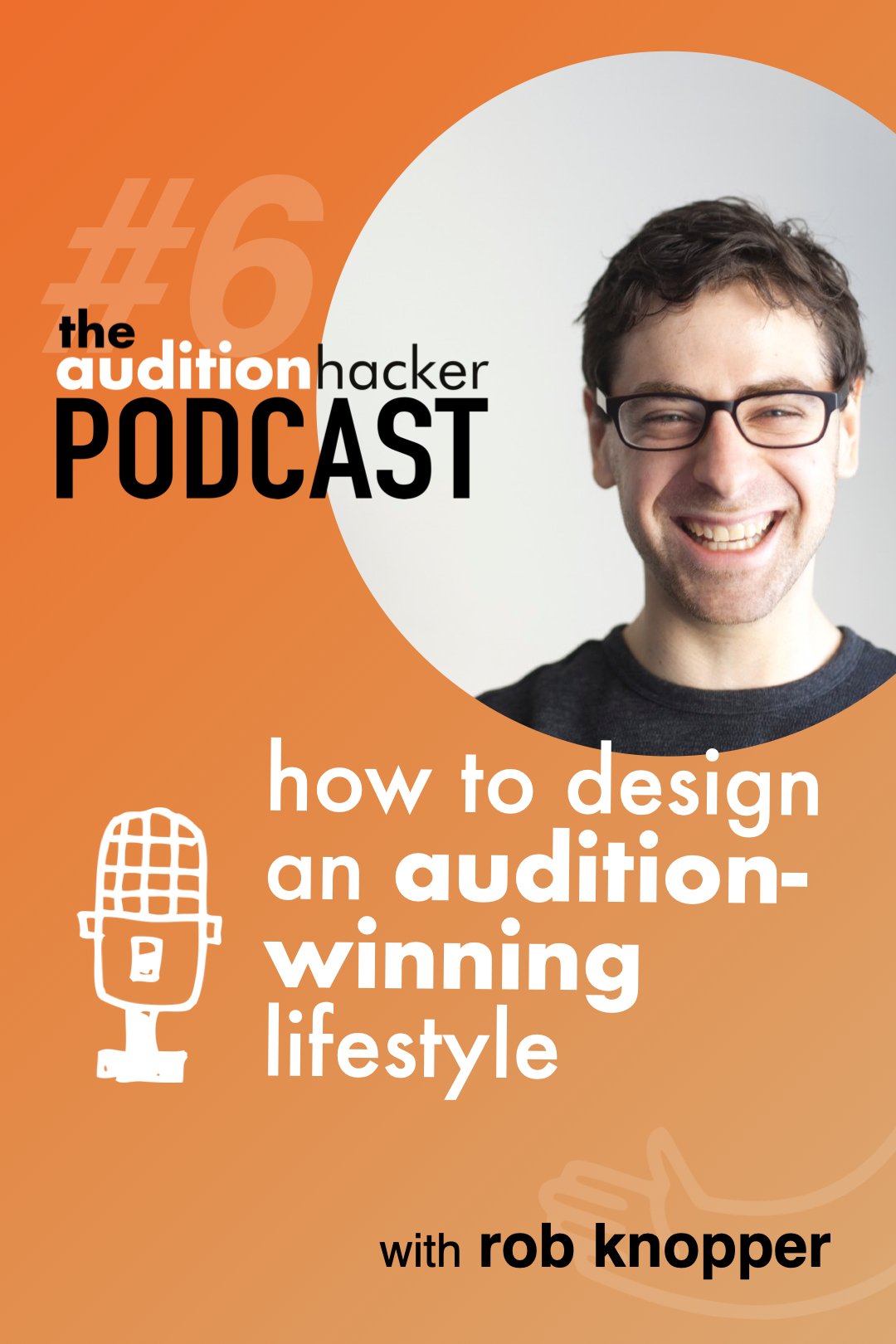the bane of my existence is lieutenant kije.
it’s a soft snare drum excerpt by prokofiev. i had to learn it for my very first audition, my last audition (the met), and pretty much every one in between. it’s on basically every audition list for percussion.
BORED. (bored. bored. bored.)
it’s not even that complicated. it’s a three line, twelve measure excerpt, and the entire thing only has two dynamic levels: piano and piano with accents. there’s no tempo changes, and the only interesting thing about it is the rhythm and the ornamentation.
i had to play it constantly for auditions from when i was 16 until i was 24. nine years of one excerpt? BORING.
looking for a breakthrough in auditions?
here's my 5-step guide to constructing your preparation process and optimizing it for maximum results.
how can you keep improving excerpts that you're already bored with?
getting bored isn’t good, and that attitude won't win auditions. you have to find a way to continue to push the excerpt forward proactively. you have to find a way to keep it interesting so you can keep improving it. so how can you keep improving excerpts that you're already bored with? before i answer that, first thing's first:
here's why they're asking this same excerpt over and over.
the excerpts that are asked at auditions are musical vessels. the audition panel could care less whether you can play this excerpt. they’re using this excerpt to hear who you are as a musician. the audition panel listens deeply to your sense of rhythm, character, phrasing, and other things through the excerpt. the only reason they keep asking this one is because it’s complicated enough to force you to deal with a bunch of musical and/or technical issues.
and you can always play it better than last time.
when you are preparing an excerpt again, you've evolved as a musician since last time. even if it's just a little, you've improved at a bunch of those elements like rhythm and phrasing. you’re recalibrating what you want it to sound like based on how you have improved as a musician.
as you improve who you are as a musician, you’re going to have a different sense of how that piece should go and you’re going to get better at figuring out how to make it sound like that. for instance, as you mature and journey through your audition career:
your sense of rhythmical precision will improve.
your sense of tone and quality of sound improves.
what kind of phrasing you like and how you can imbue a phrasing plan into an excerpt improves over time.
for me, the excerpt is an excuse to work on something. even if i’m preparing the excerpt again, after preparing it a whole bunch of other times, this time’s different. i’m better at x, y, and z because of whatever else i’ve been working on in the meantime. the excerpt is a vessel, and the vessel carries all of the components of the excerpt. and through that vessel, i can imbue the excerpt with whatever new skills or ideas that i’ve learned since the last time i played the excerpt.
an excerpt isn’t one project, it’s a bunch of tiny ones.
an excerpt is a series of projects broken up into the different categories of musicality, like rhythm, dynamics, pitch, accuracy, character, etc. it’s a bunch of different segments of notes, all sewn together to create one cohesive excerpt. each segment of notes is its own project. let’s define a few ways to break up an excerpt:
musical components: rhythmic precision, dynamic precision, pitch accuracy, articulation, tone, phrasing, character, style, etc.
each one of these can be isolated, evaluated, and addressed.
segments of notes: 4-bar phrases, single measures, half-measures, single beats, etc.
these are the building blocks of the excerpt. zoom in and work on the smallest segments, then build them together like a puzzle.
so when you're working on an excerpt, your approach shouldn't be, “let’s just run this excerpt a few more times until it’s good.” you should be saying, "let’s break this excerpt up into categories of work. how does my excerpt sound? how can i isolate a weakness? how can that weakness be improved?" and then, "how can i seamlessly integrate that isolated component back in with the rest of the excerpt?"
so how do you find new things to work on?
step 1: record and listen back to the audio 4 times.
each time, focus on a different musical component. one time for rhythm, one for pitch accuracy, one for dynamics and articulation, and one for phrasing and character. (or hey - break it up however you want!)
analyze your excerpt individually for each one of these things. and as you go through, you can start finding specific ways that your excerpt can be improved.
step 2: isolate a weakness.
while you’re listening back, find something that needs improvement. cut out a section of music, and isolate it. it can even be as small as 3 notes. give yourself a task: “for these two beats, i’m going to adjust the crescendo so it’s smoother.” or, “i need to find a way to play these two 16th pickup notes so they aren’t crushed.”
step 3: work on it.
be creative. play it at different tempos, dynamics, or with different amounts of pressure. experiment with solutions until you find something that works. create a series of exercises or ways to work on that weakness individually.
step 4: integrate it back into the excerpt
add notes from around the section to the isolated segment that you’ve been working on. make sure that whatever you just improved is retained. and make sure that the other notes around the improved segment are also happening in the way they’re supposed to happen.
step 5: repeat!
cycle through the different components. work on all the musical components, and go through each tiny segment of notes. build your excerpt from the ground up. each time you prepare this excerpt for an audition, your standards are different. so each time you should be digging down into the tiniest details of the excerpt and forcing the notes to sound better than they ever have before.
so why is this less boring?
here’s why. suddenly i’m not working on the project of “lieutenant kije,” i’m working on a new skill. and maybe this new skill is, “how to play three 16th notes in a row after a 4 stroke ruff at quarter note = 120.” i’ve isolated that specific region of the excerpt all by itself, and i can work on it as its own project. it’s not boring old lieutenant kije - i’m working on a project of 3 right hand strokes in a row after a double. [nonpercussionists: sorry for all the drum jargon.] or something like that. that project is different from any project i’ve ever worked on specifically. and therefore, it’s not boring. it’s something new, it’s something different, and it’s something i’m not good at that needs work.
don’t just run the excerpt! that’s the lazy way.
the worst thing that you can do is go through this blindly, without thinking, and keep running it over and over. when you’re just running it over and over, you’re not actually digging into the problems. you need to break it down conceptually, break it down physically into small sections, and identify your weaknesses. once you’ve addressed all the little mini-problems within the excerpt, then you can have a separate project of putting the pieces back together and turning it into a full excerpt.
isolate the musical components and then put them back together. maybe you figured out how to play this excerpt with better rhythm, then you worked on imbuing phrasing. but can you play it in ONE way that includes both rhythm and musicality? isolate the physical components. if you can play a grouping of a few notes better than before, can you work on whatever comes before and transition into those few notes?
there’s always some other way to break it down and some new problem to solve. if you find yourself facing the same problems, then of COURSE you’ll get bored. to me, i try to never get bored with an excerpt. an excerpt isn’t JUST an excerpt. it’s a collection of tiny, interesting details, all of which can be addressed separately and solved on their own.
looking for an audition breakthrough?
here's my 5-step guide to constructing your preparation process and optimizing it for maximum results for any instrument.















in 2019, a cellist named maria reached out to me about her audition struggles. on paper, she was the “worst audition candidate ever” (her words). she had 2 small children, a full-time teaching job, and hadn’t taken an audition in 4 years.